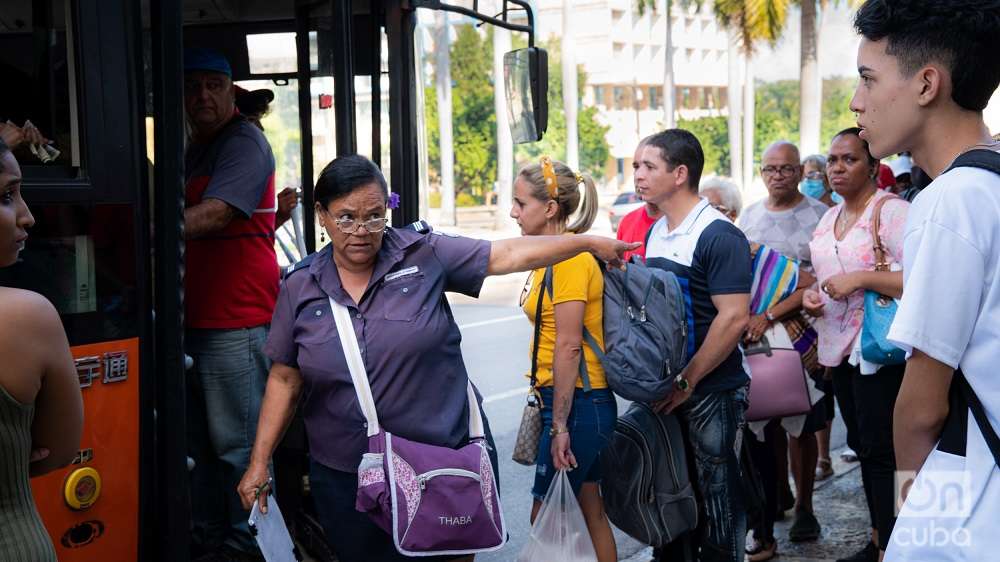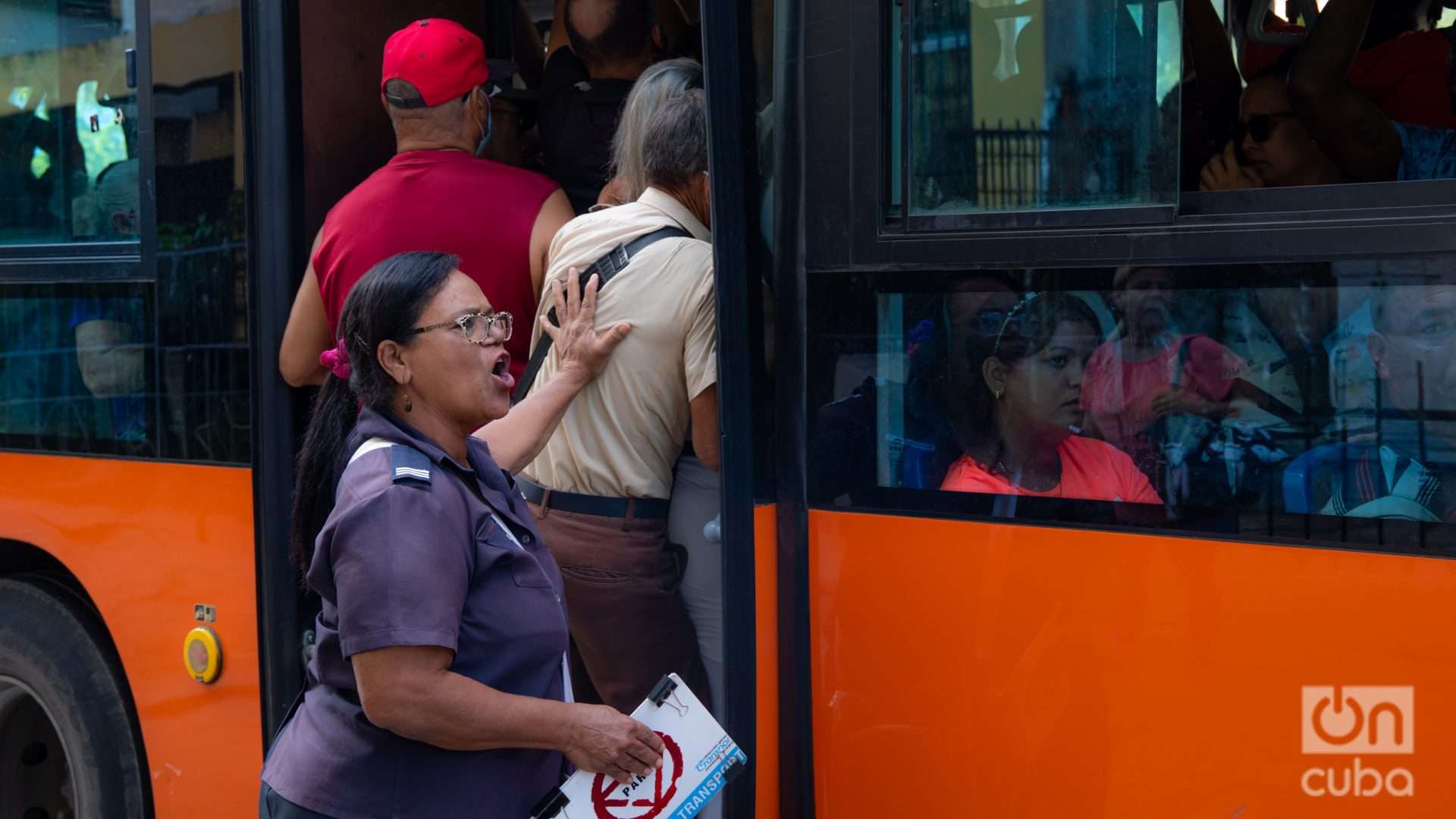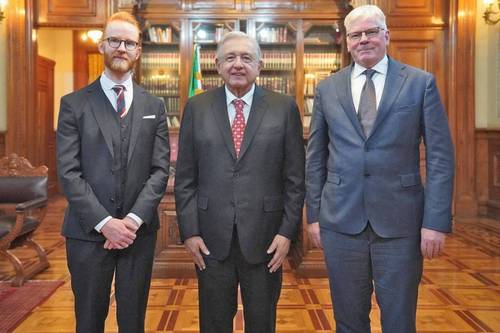At the Boyeros stop between Tulipán and La Rosa there are two queues: one for P12; another for P2 and 174. In the mornings that little corner gets intense. People who go to work get desperate; the boys who go to school listen to some shooter Fashion; the old people look for a place in the shade.
There they sell you a pack of puppies; someone argues about immigration policy; another gun and take apart a Rubik’s cube; a couple argues, another hugs; some ask for the last one, others want to sneak in. Some wait patiently and resignedly for the bus to arrive; others are live in case a car passes, a router or someone from a company overtakes you. There are people on crutches; women with cars and small children; people with carts to run errands and all kinds of jolongos, odds and ends.
In the midst of the hubbub, to which is added the terrible noise of the traffic in Boyeros between 7 and 10 in the morning, she is there, radiant and harmonious. There we have seen her through the times of the times, organizing her queues, undoing the chaos, imposing herself on her joints.
Today we had rice, red beans, hash with chard, and a tomato, cucumber, carrot, and beet salad. We finished making lunch and went out to look for María del Carmen at the bus stop. At 1 in the afternoon she leaves for the company to deliver the day’s reports, but she gave us a few hours of her time.
It’s a special lunch. The food isn’t great; The extraordinary thing is that, neither short nor lazy, we took the transport inspector home. We take the one with the powerthe most sought after, the most loved and the most hated, the most important woman in the world for those who go to try their luck every morning in Boyeros and Tulipán.
The three of us finished lunch and started to brew a little coffee. If at a stop a Cuban tells you his entire life, with the sun at his point and the despair of getting on a bus, imagine everything we tell each other over the after-dinner meal.
She grew up with her father and stepmother, who had two children and was a wonderful woman. She says that she was a terrific seamstress. If he made little gingham dresses for her and her sister, he also made a little gingham shirt for her brother. And so the three children of different blood dressed alike.
In that house he was happy. She then went to the School in the Country, she fell in love and got pregnant at 15 years old. She wanted to live at her boyfriend’s house. “But since I am this color and he was white, they didn’t accept me,” she says. Her first great love could not resist prejudice and she returned to have her daughter in her family home, where she had been taught that we are all different, but equal.
María del Carmen does not like to go for a snack if the stop is full. Generally, around 10:15, she manages to get everyone on track and tells the two or three that remain: “I’m going to have a snack, I’m not the daughter of any god!” Luckily, near the stop they sell fried foods and sometimes she has money to buy them.
I don’t know how he lasts until that time without eating anything since 4, which is when he has breakfast. Since transportation is so bad, she, the transportation inspector, has to leave her house in the Reparto Martí neighborhood from 5 in the morning and get on whatever it takes to get to her job before 6.
While we serve the coffee, he gets excited and tells me about his father, who is not a god but he is an extraordinary being.
“My father’s name was Eusebio Pestana Sánchez and my name is María del Carmen Pestana Sánchez.” She tells me with more pride than sadness that she carries both of her father’s last names. She says that as a child she never asked why. Over the years, she became close to her biological mother and, since her sister had left “for El Norte”, she was the one who took care of her until her death. “My little daughter called her Grandma Linda, because she had long hair on her buttocks.”
María del Carmen speaks with a sweetness that shudders: “You have made me remember things that I had not remembered for years.”
I try to imagine Abuela Linda and the mother who raised her. In the voice of María del Carmen I deduce that they were special women. Between the vagaries of memory, she tells of her youthful love; from when she became rebellious and left the house; from when she worked as a stretcher at the Aluminum Factory in Santiago de la Vegas, stretching the profiles to make windows, frames and doors.
“It was a rustic job,” he tells me and he squeezes his mouth as if he wanted not to remember those tasks.
Hard work that he has now, standing for more than six hours dealing with all kinds of people. I ask him how he got into the world of transportation.
“I had to take the bus every day at the Cerro y Boyeros bus stop to go to the factory and I always saw an inspector who was really nice…”. One day, after having his eye on him, he said to him: “Boy, get me a job to leave the factory.” She wanted to just mess with him; but after a few days the boy, whose name was Tomás, told him that he had a position for him.
That’s how it started in this, at the time of Los Amarillos, as the transport inspectors were told by the uniforms they wore.
His work history is a love story. It turns out that Tomás leaves Los Amarillos and starts working as a driver on the Palatino bus. “One day I see it; I come back with my freshness and I say: Child, how cute you are, do you want to marry me?
“It was playing, of course,” she says laughing; but when she finished working that afternoon, Tomás went looking for her to go get ice cream. It would be the beginning of a very beautiful love from which her youngest daughter emerged.
When one sees María del Carmen at the bus stop telling people: “Come on, my love… walking… Come on, my life…”, one cannot help but imagine that she does her work out of love, that in her story there is a lot of resistance and much love given and received.
She says that Tomás was the best father, man, friend and companion that she could have found. He tells me that they took turns to work.
“We shared ourselves; he worked in the morning on the bus and I worked at a bus stop in the afternoon. He would pick up the girl in her circle, bathe her, and do it all. When I arrived, it was just bathing and combing the girl’s hair and putting the little stocking on her head to sleep”.
From time to time they alternated: he worked in the afternoon and she in the morning. She tells of the good things she experienced with Tomás and moves her hands as if they were going to fly out of my window. “Covid-19 has been dead for a year or so,” she says, lowering her hands and looking down to look into the cup.
Have a little cup of coffee. “How delicious it is!” He tells me, smiling. I explain to him that it’s half the winery and half the La Llave that my brother from Tampa sent us; that my mom mixes them so that the good flavor lasts longer.
In twenty-five years of working as a transport inspector, María del Carmen has visited several stops: Covadonga, Esquina de Tejas, Cerro y Boyeros, the P11 stop at G and 27 and Tulipán, which is her favorite stop and the one where she most has worked.
I ask him why he likes it. “Says you. Now say you, why do I like it? I love that stop! It’s a tiring stop; but I love that activity you have. I don’t like working on dead stops. Those stops where only one car passes by… Whoa! I don’t like that litany. I like the stops of movement”.
When they do the rotation every three or four months, she goes back to Tulipán. She doesn’t find it difficult; her classmates don’t like her movement like her. There are those who prefer quiet stops. “I really love! Besides, the old people come to talk to me and when I’m absent they feel it in their soul”.
They say that when the inspector is not there, the stop is chaos. And I know it well, because it has been my stop for about ten years. I don’t know what she has; but when she arrives, cars begin to pass by everywhere. It is the talisman of the stop.
“That fills me with joy, it swells me, it makes me feel good that people love me and that I can help them. I’m lovin ‘it”. She talks with such emotion about what he does that I don’t know how to repay him for the time he spent coming to have lunch with us.
He shows me the clipboard on which he keeps the reports for the day. He explains to me in detail where he writes down the tickets for the buses and where he keeps track of the state cars that pick up people and those that refuse to stop. He says that then someone goes to those companies and measures are taken with the selfish drivers.
I ask him what is the worst schedule: “Today, all schedules are hard. Sometimes I have arrived at 5:45 and nothing else happens until 6:30. At that time the stop fills up right away. I can be emptied in 5 minutes; but you give two eyelashes and it’s already filled up again ”.
When he says “me stop” I know you feel that way. Despite the fact that working with the public is not easy and there are many problems, I see her struggling with people, trying to help. I have seen her stop a car and ask the driver about her family; I have seen her educate the rude and send back those who want to sneak in.

Everyone knows and respects her. She has educated the people at the stop and also the drivers to stop even if they are full. “When they see me, they know they have to stop and where they have to stop. If I can ride two people, it’s something, two people for each door are already six people who left my stop”.
After so many years, María del Carmen is thinking of retiring. Her legs ache from standing so many hours every day; but she doesn’t like office work. They have spoken with her to transfer her to the company; but she likes the street, the people. What she would like to do is rest for a while and look for “another little job”, because life is hard.
I asked her what would change if she were the transport minister: “It is very difficult, I tell you that being transport minister today… That is not easy. Because we are many bus stops, there are no spare parts, the country’s economy is not very good and sometimes the terminal administrators do not help either. Not having parts to fix cars, not having the conditions to work… it’s very difficult. Today, being a transport minister is a very big complication”.
I asked her what her biggest dream is: “Oh, mijita, I don’t even know, right now… to be with my daughters, my grandchildren and my great-granddaughter, and may God give me enough health to enjoy all of them”.
I thank her for accepting the invitation to lunch and I tell her that we have been watching her for some time, taking photos and scrutinizing, from a quiet corner, her way of working. I share my dreams: I wish we had more Marías del Carmen at the stops. I wish the administrators and those in the offices would put their chests out for people like she does every day. I confess our admiration and tell her that she is an example, a star.
We parted ways; I close the door, look at my altar and think: “Virgencita de la Caridad del Cobre, thank you for María del Carmen”.















